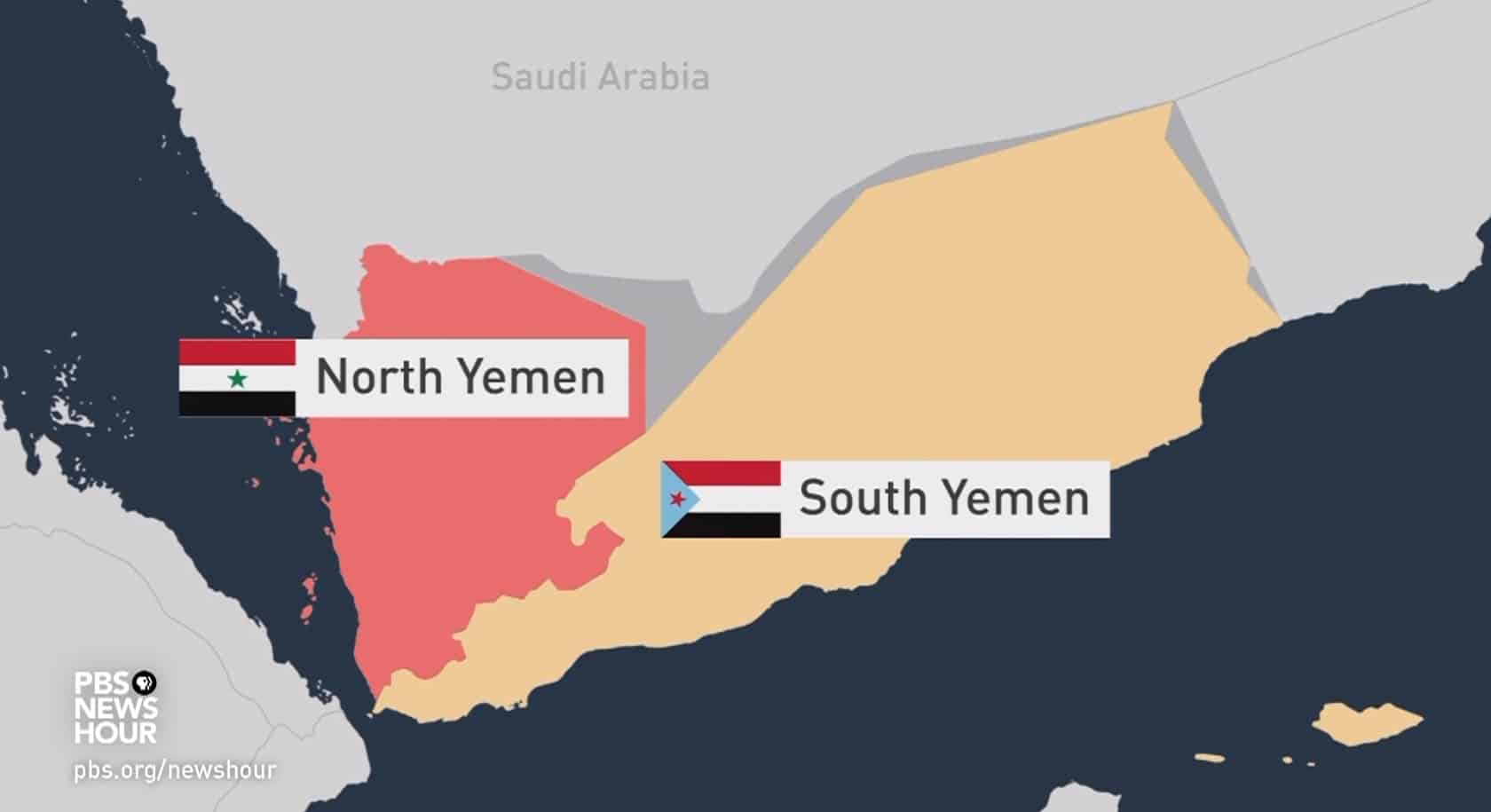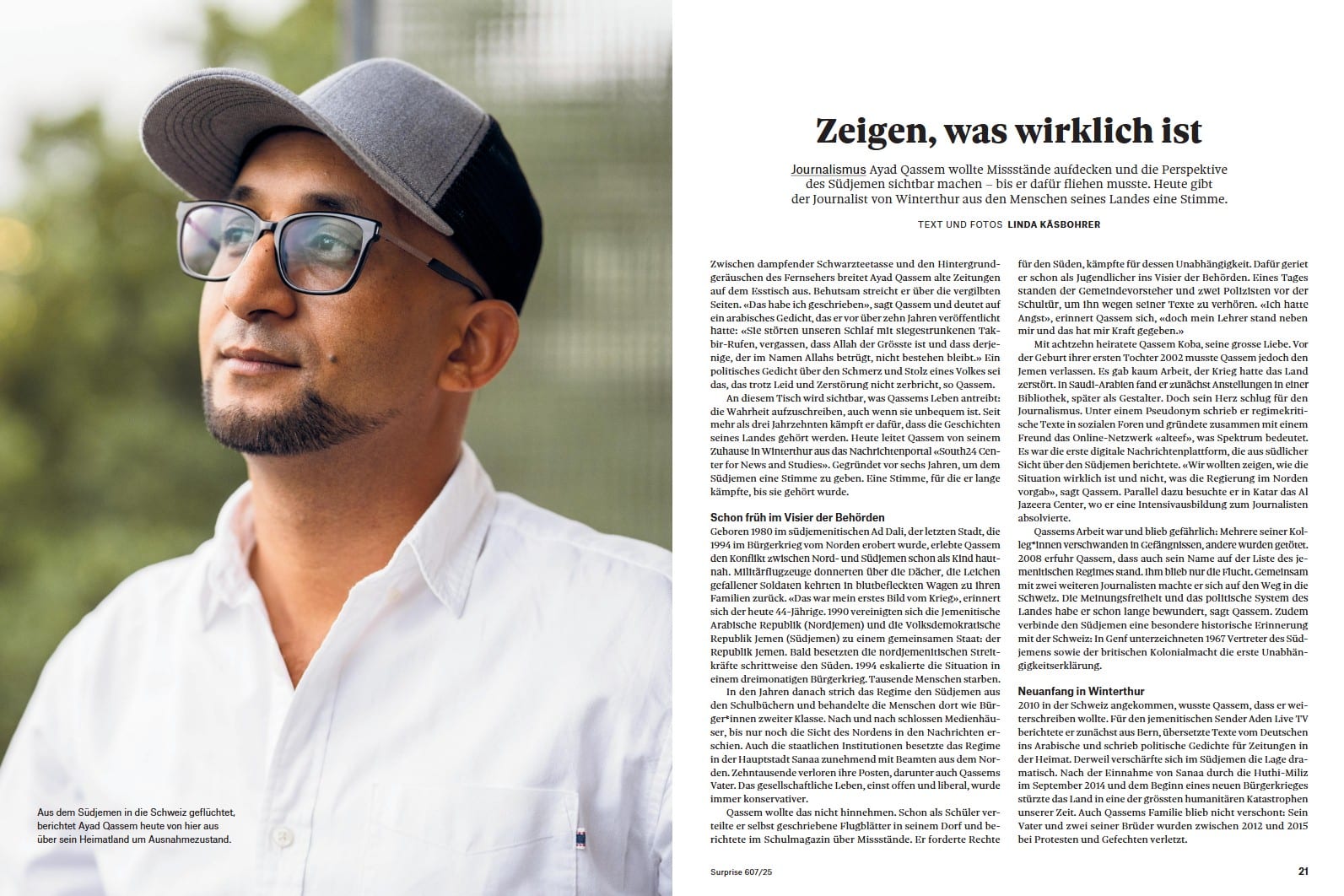
آخر تحديث في: 14-06-2025 الساعة 7 مساءً بتوقيت عدن
Aden*
The war in Yemen is now in its seventh year, and shows little sign of ending soon, despite the horrific humanitarian toll. Within the war between the Houthi rebels, backed by Iran, and the internationally recognized government of Yemen are other battles that threaten to split the country in two.
For her final report inside Yemen, American PBS special correspondent Jane Ferguson looks at the war to divide this land.
The port city of Aden, in the South of Yemen, has been hammered by the country's six-year war. It bears the scars in many places.
In 2014, after Iran-backed Houthi rebels seized control of the capital Sanaa, they swept South to Aden. People mobilized, armed themselves and, supported by a Saudi-led coalition, pushed the rebels back north. For many political leaders here this war has opened both an old wound and an opportunity, the push for independence from the north of Yemen and breaking the country into two parts.
"We fought hard and liberated all our cities in five months. In the beginning ,this was a civil society revolution, but the Southern people back then created a military power," said Nasser Al-Khobaji.
Dr. Nasser Al-Khobaji is senior leader in the Southern Transitional Council, or STC, the main political and armed force in Southern Yemen, calling for independence.
The city of Aden, the flag of the state of South Yemen was raised on a large mast (Extracted , PBS)
"This power could now fight for years. So the choice now will be to either choose a long war or the peaceful solution, which is dividing Yemen into two countries."
The STC's leaders and military largely rules the south of the country and areas around the city of Aden.
"When we say we want to get our country back, we are saying we want to go back to the old borders, when the British were in the south and the Turks were in the north, said Al-Khobaji "The British drew the border."
Yemen hasn't been a unified country for long, only since 1990. From the middle of the 19th century, the south was ruled by Colonial Britain and local emirs, while the north was apart of the Ottoman Empire.
When both the British and Ottoman Empires receded after the First World War, local, separate authorities ran the two territories as different countries. From 1990 to 1994, southerners fought and lost a civil war with the north, trying to regain their independence.
Southern Transitional Council official, Nasser Al-Khobaji speaking to PBS ((Extracted)
These days, in downtown Aden, it's not hard to find people filled with nostalgia for a former period in this city, not only before the current war, but before unity.
"There is no comparison. Aden was the mother of the world. Aden was the most beautiful city in the Arabian Peninsula," said a man "Now it is ruined. It's possible that, after the war, we may get independence. It's the solution for us southerners. If we stick with unity we will have the same problems."
As efforts to end the war in Yemen step up, it's not clear what a postwar Yemen would look like or whether it could even exist as a unified state.
The war offered armed groups an opportunity to rule areas they themselves either came from or took. Now bringing these regions all under one government is a serious challenge.
Elana Delozier said that "There are sort of enclaves of governance in Yemen, and different ones. So there's some that are controlled by the Houthis, some by the government, some by other forces."
"And so the real question is, what happens when the war ends? How do we work that out?" asked Elana DeLozier, an expert on Yemen and Gulf states with The Washington Institute. "And I think part of the answer is probably some sort of federalist system".
Security forces in Aden, also showing the South Yemen flag (Extracted , PBS)
"Conceptually, there has always been a sense of local politics. You know, all politics is local, and, in Yemen, that has long been the case. And so I'm not sure that this idea that we are going to have one totally psychologically unified Yemen is necessarily going to be the case," added DeLozier.
Making things more complex, there are more than two sides in this war. The Houthi rebels control the capital, Sanaa, and much of the north.
To the east, in Marib, they are battling the internationally recognized Yemeni government. Marib is the government forces' last major stronghold. Technically, the separatists and the government are allied in their fight against the Houthis, but it's a relationship of convenience alone.
Muddying things further is the fact that both sides are backed by separate regional partners. The Saudis back the Yemeni government forces in Marib and the United Arab Emirates supports the separatists in the south.
Just as Iran is allied the Houthis, in Yemen, regional players each back a side.
"Of course, we have a great relationship with the Emiratis. I think they helped build the military power in the south because they were partners in the war against Houthis. And this gave us a relationship with them now and in the future,"said Nasser Al-Khobaji.
If the Yemeni government loses Marib to the Houthis, it would weaken them severely in any upcoming peace talks. It could also help the southerners in their push for independence.
In an interview with the "NewsHour," senior Houthi leader Mohammed Ali Al-Houthi dodged the question of whether a Houthi takeover of Marib would hasten a split of Yemen between north and south.
Mohammad Ali Al-Houthi talking to "Jane Ferguson" (Extracted , PBS)
"From an Islamic perspective, we want unity between the whole Islamic community. And we hope the Islamic community will get as powerful as the Americans have now. Now the whole world wants unity," said Al-Houthi.
Driving between territories controlled by different forces and groups is like driving between different Yemens, each less a part of a whole as the years tick by in this war.
The country's fragmentation is coming to feel permanent as each group entrenches. In the capital, Sanaa, where the Houthis enforce tight control, few people want to speak openly about politics. Many have been jailed here for opposition to the group. And we were watched very closely as we worked.
Most Yemenis are trying to keep their heads down and survive not only the war, but also the politics surrounding potential peace. Yet, hospitality endures. This man, Mr. Al Araby, owns a large nut shop in the old city of the capital.
"Between us Yemenis, we are brothers. We are one Yemen. North, south all are Yemenis. Saudis and Emiratis, they don't want Yemen to be one country united, but as Yemenis, whether it's the north or the south, we are the same, we have the same blood," said Mr. Al Araby.
Food is brought out, bread is broken with us, and little more of politics is discussed. Everyone here agrees on one thing. They all want the war to end.
South Yemen flag on a military vehicle (Extracted , PBS)
"We didn't attack anyone. We have hope. We want peace. We demand peace. But they attack us. The war will not come to any result. It is just destroying everything," added Mr. Al Araby.
Back in Aden, well to the south on the water, a similar sentiment endures.
Since the war broke out, neither the internationally recognized government, nor the separatist leaders, have been able to provide basic services, jobs or aid to the people.
While politicians in this part of Yemen are passionate about independence, the people we talk to on the street tell us that it's important to them, but what's more important is simply that the war ends and the economic hardships that came with it end too.
There is a growing bitterness here and a sense here that regional partners are pursuing their own interests, while Yemenis struggle to live through the humanitarian crisis this war has brought.
Wajdem Mohammed is a police officer fighting to get by. "Yes we want separation. We were good when we were alone. Now there is no electricity or salaries." he said.
A retired telecommunications engineer, Ali Ghazen doesn't believe the war will end any time soon.
"No, it doesn't mean that war will bring independence more quickly. The war will continue." Ali Ghazen said "If there is no peace, there is no stability. If there is no stability, there is no independence."
As the war in Yemen appears to reach a battlefield climax in Marib, and President Biden pushes for peace, imagining what Yemen will look like if and when the guns fall silent is increasingly complicated.
A cease-fire may be the easiest part. Putting the country back together again will be much harder.
* Originally published by the American PBC (NewsHour) network, as part of a field report by "Jane Ferguson"
- South24 only collected text and cropped images from within the report.

قبل 3 أشهر

قبل 3 أشهر